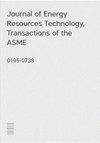Evaluation of Multi-Functional Variable Refrigerant Flow System with Thermal Energy Storage and Photovoltaic-Based Distributed System for Net-Zero Energy Home Design
IF 2.4
3区 工程技术
Q3 ENERGY & FUELS
Journal of Energy Resources Technology-transactions of The Asme
Pub Date : 2023-06-19
DOI:10.1115/1.4062765
引用次数: 0
Abstract
Efficient heating and cooling systems and renewable energy sources are crucial for effectively designing net-zero energy homes (NZEHs). The study proposes using a multi-functional variable refrigerant flow system with hydraulic heat recovery (MFVRF-H2R) to reduce HVAC and hot water energy usage, offering a practical approach to enable NZEH solutions. Photovoltaic (PV)-based on-site power generation is utilized to achieve zero-energy performance in residential buildings. A building energy simulation study is conducted to assess the effectiveness of the combined systems in various climate conditions. To develop the simulation model, the US National Institute of Standards and Technology (NIST)'s net-zero energy residential test facility is used as the benchmark for NZEH baseline models. The MFVRF-H2R system is incorporated into the NZEH baseline to propose a more-energy efficient design with heat recovery technology. eQUEST and post-processing calculations are used to simulate NZEH performance, comparing whole-building energy end-use and PV capacity for the baseline and alternative models with MFVRF-H2R. Results demonstrate that the proposed VRF-based NZEH design can provide potential energy savings of up to 32% for cooling energy under various climate zones. Moreover, the NZEH design with the proposed MFVRF-H2R can achieve up to a 90% reduction in domestic hot water usage compared to an NZEH design without VRF heat recovery technology. The study suggests that the MFVRF-H2R system can provide practical and realistic solutions for making HVAC energy-efficient by minimizing thermal waste and reusing it for other thermal parts of the building, such as hot water applications. Consequently, this study highlights the effectiveness of the MFVRF-H2R system in designing NZEHs while considering heat recovery and renewable energy technologies.多功能可变制冷剂流量蓄热光伏分布式系统在净零能耗家居设计中的应用
高效的供暖和制冷系统以及可再生能源对于有效设计净零能耗住宅(NZEHs)至关重要。该研究建议使用多功能可变制冷剂流量液压热回收系统(MFVRF-H2R)来减少暖通空调和热水的能源使用,为实现NZEH解决方案提供了一种实用的方法。利用基于光伏(PV)的现场发电来实现住宅建筑的零能耗性能。进行了建筑能源模拟研究,以评估组合系统在不同气候条件下的有效性。为了开发模拟模型,美国国家标准与技术研究院(NIST)的净零能耗住宅测试设施被用作NZEH基线模型的基准。MFVRF-H2R系统被整合到NZEH基线中,通过热回收技术提出了更节能的设计。eQUEST和后处理计算用于模拟NZEH性能,比较了MFVRF-H2R基线和替代模型的整个建筑能源最终用途和光伏容量。结果表明,在不同气候条件下,基于vrf的NZEH设计可提供高达32%的潜在节能。此外,与不采用VRF热回收技术的NZEH设计相比,采用MFVRF-H2R的NZEH设计可以减少高达90%的生活热水使用量。研究表明,MFVRF-H2R系统可以提供切实可行的解决方案,通过最大限度地减少热浪费,并将其重新用于建筑的其他热部件,如热水应用,从而提高暖通空调的能效。因此,本研究强调了MFVRF-H2R系统在考虑热回收和可再生能源技术的情况下设计nzeh的有效性。
本文章由计算机程序翻译,如有差异,请以英文原文为准。
求助全文
约1分钟内获得全文
求助全文
来源期刊
CiteScore
6.40
自引率
30.00%
发文量
213
审稿时长
4.5 months
期刊介绍:
Specific areas of importance including, but not limited to: Fundamentals of thermodynamics such as energy, entropy and exergy, laws of thermodynamics; Thermoeconomics; Alternative and renewable energy sources; Internal combustion engines; (Geo) thermal energy storage and conversion systems; Fundamental combustion of fuels; Energy resource recovery from biomass and solid wastes; Carbon capture; Land and offshore wells drilling; Production and reservoir engineering;, Economics of energy resource exploitation

 求助内容:
求助内容: 应助结果提醒方式:
应助结果提醒方式:


